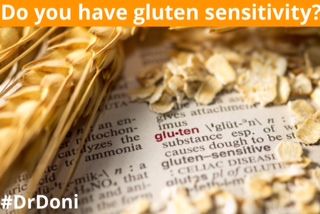
Gluten allergy symptoms are similar to those of food allergies. Gluten, also called gliadin, is a peptide that is located in wheat, rye, barley and oats. If you have an allergy to gluten, then you may have gluten allergy symptoms. Although the symptoms of gluten intolerance are often confused with other common conditions, the symptoms of gluten allergy are different.
Gluten allergy symptoms can include a rash or hives, a runny nose and/or eyes, nausea, stomach cramps and diarrhea. This is not a simple case of food intolerance; gluten allergy often goes far deeper than that. Gluten allergy symptoms often cause a tight feeling in the chest, an upset stomach, shortness of breath, coughing, sneezing, lightheadedness and stomach cramps. Since gluten intolerance is caused by an allergic reaction to gluten, the symptoms can sometimes be mistaken for other diseases. In fact, some of the symptoms of celiac disease are very similar to those of gluten intolerance.
Although the symptoms of gluten intolerance are not always recognized as symptoms of a more serious condition, they should be. A food allergy is usually identified after a series of tests are done. After the testing, the allergist will determine whether or not you have a gluten sensitivity. It is important to note that a gluten sensitivity may have a different set of symptoms than an allergy.
People with gluten allergy may develop intestinal problems, like diarrhea and cramps
A leaky gut may be the cause. A leaky gut may be due to another medical condition, too.
Symptoms of celiac disease can also be mistaken for gluten sensitivity. The most common gluten related symptoms are diarrhea, bloating, weight loss, anemia, fatigue, or an inability to digest the foods well. Another symptom of gluten intolerance may be stomach pain and cramping. If you experience these symptoms and the person you are with says they are gluten free, check the person carefully and see if you have an allergic reaction. if so. If you do have an allergic reaction, your best bet is to consult your doctor immediately.

There are medications available for food allergy. The anti-tissue soluble factor in gluten is known as gliadin. Because of this property, gliadin cannot be broken down by human enzymes.
Celiac disease, which affects people with gluten sensitivity, has many symptoms. Symptoms are usually not the same for both types of the disease. However, more serious cases of celiac disease can include anemia, malnutrition, muscle weakness and bone loss, joint swelling, depression, and anemia.
There is no cure for celiac disease. Since gliadin cannot be destroyed, the body cannot break it down. So, if the body is damaged, it cannot repair itself. In other words, if you have food allergies or celiac disease, you cannot heal or absorb nutrients.
However, there are certain foods you can. The key to keeping this disease under control is keeping your body immune by taking special supplements, avoiding certain foods, and choosing foods carefully. Eliminating gluten can help you control the severity of your symptoms.
Food allergies or celiac disease can cause complications such as digestive problems, joint damage weight loss, low energy levels, and malnutrition. If you are celiac, you should also take extra precautions when choosing foods to eat, avoiding foods high in gluten.
Gluten is one of the leading causes of inflammatory bowel disease. Gluten can lead to leaky gut syndrome. People with leaky gut have a leaky gut and may experience abdominal pain, cramps, diarrhea, and fatigue. These conditions are caused by inflammation, which is the body's response to bacteria or toxins entering the bloodstream. When inflammation occurs, your gut cannot filter these toxins properly.
Gluten can also cause many other health problems, such as skin conditions, acne, eczema, and arthritis. Your diet is important to prevent Leaky Gut Syndrome, so be sure to include more vegetables and fruits in your diet. The only way to get rid of celiac disease is to avoid foods that contain gluten.